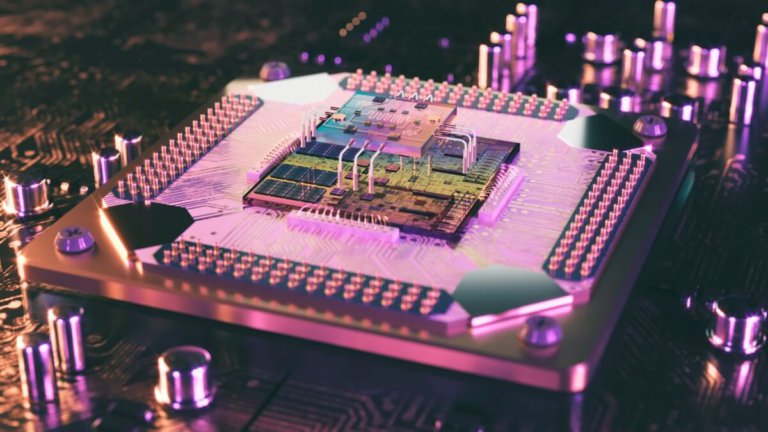
Computers have transformed how we work, play and communicate. It’s a revolution that isn’t slowing down, and new advances in quantum technology could result in incredible new capabilities for phones, medical devices, transport systems and beyond.
Traditional computers contain millions of transistors, which have a value of zero or one. This binary, one-or-the-other-type ‘language’ is vital for making our devices work. But what if, taking advantage of the strange physics of the very small – in the quantum world – we could build transistors which had a value of zero and one at the same time, or somewhere in between.
This is the promise of quantum computing.
In real terms it could mean more accurate weather predications, improved commute times, safer aeronautical systems, better identification of planets and life, smarter self-driving cars, improved drug treatments and hyper-personalised marketing.

Source: UQ Faculty of Science
Professor Tom Stace from The University of Queensland’s (UQ) School of Mathematics and Physics said that quantum physics had grown from an almost exclusively university-focused, research-only field, to a booming commercial industry.
“It’s exploding, with global investment creating openings for an estimated 20,000 specialists in the quantum field, with a shortage of talent not only in Australia, but worldwide,” he said.
“Quantum technologies are finding applications in cryptography, chemistry simulation in medical and industrial processes, and the development of more accurate sensors for detection and measurement. The field is deeply fascinating, and understanding in this area will be increasingly important as a technological foundation for new professionals.”
UQ is fast being recognised for its quantum technology innovation.
One of the many new technologies being developed at the university – the most sensitive ultrasound device ever created – could transform everything from medical devices to unmanned vehicles.
“This is a major step forward, since accurate ultrasound measurement is critical for a range of applications,” said one of the device’s lead inventors, Professor Warwick Bowen, from UQ’s Precision Sensing Initiative and the Australian Centre for Engineered Quantum Systems.
“Ultrasound is used for medical ultrasound, often to examine pregnant women, as well as for high resolution biomedical imaging to detect tumours and other anomalies. It’s also commonly used for spatial applications, like in the sonar imaging of underwater objects or in the navigation of unmanned aerial vehicles.
“Improving these applications requires smaller, higher precision sensors and that’s exactly what we’ve been able to develop. The technology is so sensitive that it can hear, for the first time, the miniscule random forces from surrounding air molecules.”
UQ researchers have also been busy making some of the world’s smallest artworks, recreating the Mona Lisa, Van Gogh’s Starry Night and dozens of other images on a quantum ‘canvas’ the width of a human hair.
UQ researchers’ rendition of the famous Mona Lisa, approximately 100 microns wide.

Source: UQ Faculty of Science
As Microsoft, Google, IBM and other global companies clamber for qualified talent, UQ has introduced a new postgraduate quantum technology program – the Master of Quantum Technology – which prepares students for these highly-skilled, highly-paid positions.
“This program is ideal for people who have trained in engineering, IT or other technical disciplines looking to utilise their skills in a new industry,” Professor Stace said.
“Graduating students will be attractive to an international market, including both Fortune 100 companies and quantum technology start-ups. And governments are also supporting quantum technology in a big way.”
Professor Stace said UQ is internationally recognised for quantum science research, having played a key role in important quantum discoveries.
“The first ‘quantum gate’ was proposed here in the late 1980s. We’ve attracted huge investment over the past 25 years, and have completed great research with it. The amount of funding UQ has received for quantum science is approaching AU$100 million.”
“It just shows that UQ is the perfect place to learn about our quantum future, and we’re busy preparing our students with these highly sought-after skills. We can only dream of what they might help build, helping create a better future for us all.”
For more information about studying a Master of Quantum Technology at The University of Queensland, visit the UQ Future Students page.
CRICOS Code 00025B
Follow UQ on Facebook, Twitter, YouTube, Flickr, Instagram and LinkedIn
Liked this? Then you’ll love…
Best career paths to Australia revealed
Vampire bat breakthrough shows bloodsuckers could save lives







